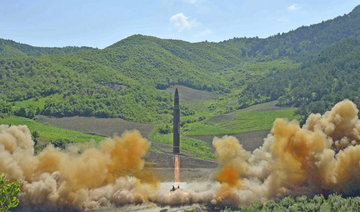WASHINGTON/BRUSSELS: The heads of the US and South Korean militaries discussed “military response options” after North Korea test launched an intercontinental ballistic missile (ICBM), the Pentagon said Friday while the EU blasted Pyongyang for posing “a serious threat to international peace and security.”
Gen. Joe Dunford, who is chairman of the Joint Chiefs of Staff, and Adm. Harry Harris, who heads the US military’s Pacific Command, spoke with South Korea’s Joint Chiefs of Staff Chairman Gen. Lee Sun Jin.
“During the call, Dunford and Harris expressed the ironclad commitment to the US-Republic of Korea alliance,” Dunford spokesman Capt. Greg Hicks said in a statement.
“The three leaders also discussed military response options.”
While the Pentagon has long planned for the possibility of conflict with North Korea, the blunt language in the statement marked a departure from previous public reactions to missile tests.
Those earlier reactions typically decried the tests but did not emphasize military options.
Pentagon chief Jim Mattis, who is currently on vacation, slammed North Korea’s first test launch of an ICBM on July 4 as a “provocation,” but stressed that the US seeks a diplomatic solution to the standoff.
Pentagon spokesman Navy Capt. Jeff Davis said Friday: “We remain prepared to defend ourselves and our allies from any attack or provocation.”
EU blasts N. Korea
Meanwhile, criticizing North Korea for carrying out another missile launch, the EU’s foreign service said in a statement the launch “is in outright violation of (North Korea’s) international obligations as set out in several UN Security Council resolutions.”
It urged Pyongyang “to refrain from any further provocative action that could increase regional and global tensions.”
EU foreign ministers, at a meeting in July, had condemned North Korea’s missile launches in similar terms.
EU diplomatic chief Federica Mogherini will take up the issue in the coming days with the foreign ministers of South Korea “and other international partners,” the statement said.
Mogherini is to attend a ministerial meeting of ASEAN Regional Forum in Manila on Aug. 6 and 7.
Friday’s late-night launch entailed the firing of what appeared to be another ICBM, according to the Pentagon.
Japanese Prime Minister Shinzo Abe said the missile may have landed within Japan’s maritime exclusive economic zone.
The launch came a day after North Korea celebrated what it calls “Victory Day” — the anniversary of the end of the 1950-53 Korean War. Pyongyang regularly times its missile tests to coincide with symbolic dates.






















